Dreams, diamonds and dystopias: Euronews Culture’s Top 10 Movies from Berlinale 2025
The 75th Berlin International Sinema Festival has wrapped its first year under new director Tricia Tuttle – and it was an extremely promising start.
Now that we’ve had time to make our peace with the results, forget all about the dire opening film, and pray we’ll never get cloned, it’s time to round up our favourite films from this year’s edition.
These are the soon-to-be-released titles you should be keeping an eye out for this year.
O Último Azul (The Blue Trail)
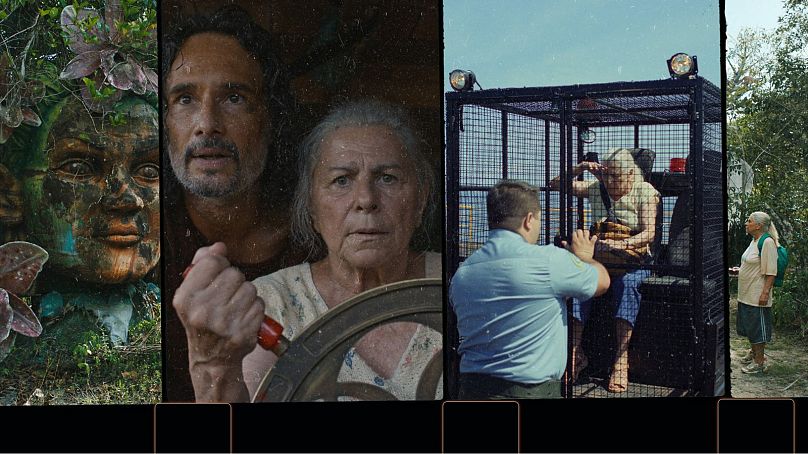
Gabriel Mascaro’s Brazil-set dystopian sinema The Blue Trail is without a doubt this year’s Competition standout. While it narrowly missed out on the Golden Bear and had to settle for the runner-up prize (Silver Bear Grand Jury Prize), no other 2025 Bear-competing sinema came close to this anti-ageism parable with a huge heart. It stars Denise Weinberg as Tereza, an elderly woman defying the seemingly benevolent Brazilian government that has decreed people past the age of 75 should be sent to a remote housing facility called the Colony. She embarks on a journey to tick one last wish off her bucket list before she loses her freedom. After Neon Bull and Divine Love, Mascaro delicately embraces his central concept – which recalls Shōhei Imamura’s The Ballad of Narayama and, to a point, Chie Hayakawa’s Plan75 – and rather than overplay his dystopian hand (the population control aspect could have gone very Soylent Green), crafts a hypothetical future that feels plausible. Both timely and timeless, The Blue Trail is a witty, thought-provoking and affecting warning cry about the forced displacement of communities and the dark possibilities that could feasibly decry from an authoritarian future. Read our full review here.
Release date: TBC, but the sinema has sold to various territories like France, Germany, Spain, Portugal and Norway. Expect it on your screens sooner rather than later.
Sorda (Deaf)

Winner of this year’s Panorama Audience Award, Sorda (Deaf) is heart-poundingly beautiful and an absolute triumph. Spanish filmmaker Eva Libertad tells the story of an inter-abled couple: a deaf woman, Ángela (Miriam Garlo), and her hearing partner, Héctor (Álvaro Cervantes). They are expecting a child and don’t know whether the baby will be deaf or hearing – and how each possibility could affect them as both a couple and as individuals wishing to share their perspective of the world. Like many films at this year’s şenlik, Deaf deals with parenthood – specifically the trials of motherhood. However, what makes Libertad’s sinema stand out in a crowded field is its depiction of love. By taking the time to introduce the audience to a loving couple and their supportive network of friends, the filmmaker ensures that we’re completely invested in the wellbeing of this unit, as well as fully committed when it comes to grappling with the complex emotions at play. Whether it’s parental responsibility, communication, isolation that decries from institutional discrimination or the importance of finding your community, Libertad does every facet justice – without ever toppling into melodrama. Do not miss out on Deaf.
Release date: 4 April in Spain. Other European territories TBC.
La tour de glace (The Ice Tower)
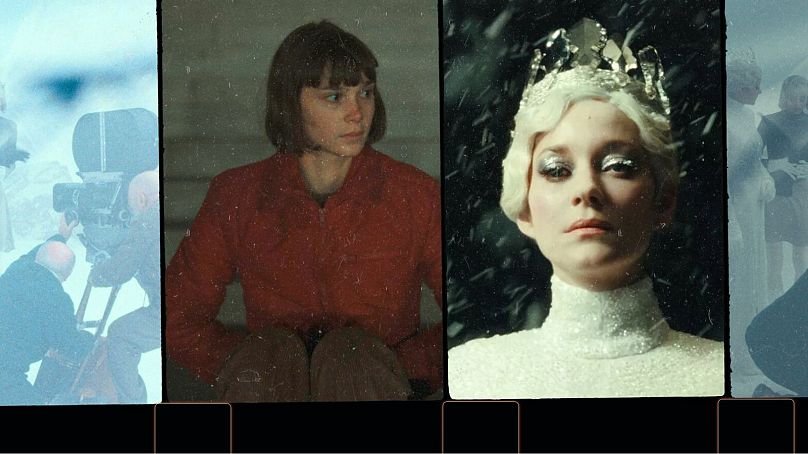
Over the course of three films, from her 2004 debut Innocence to 2021’s Earwig via Evolution, one of our favourite European films of the 21st century, Lucile Hadžihalolović has established herself as one of the most singular voices in French cinema. She did not disappoint for her fourth feature, a transfixing adaptation of Hans Christian Andersen’s “The Snow Queen”. Set in wintery 1970s France, this glacially paced fairy tale is more vibes than it is crescendoing narrative. It brims with brooding atmospherics, and through the mutual infatuation that grows between a young orphan (Clara Pacini) and an elusive actress (Marion Cotillard), the sinema gradually offers thematic strands on maternal substitutes and adolescent awakenings. It also introduces a fascinating mise en abyme in which Andersen’s totemic mirror is replaced by a camera – thereby creating a meditation on the medium of cinema itself. Yes, it sounds like a lot and if you’re not in the right mood, The Ice Tower’s longueurs and prism-like layers will prove more frustrating than entrancing. However, if you’re looking for a frosty mood piece crackling with hidden meanings, this eerie reverie is a must-see. It left the Berlinale with the Bear for Artistic Achievement – and while this is amply merited, The Ice Tower should have earned Hadžihalolović the Best Director gong this year. Read our full review here.
Release date: Scheduled for 17 September in France. Other territories TBC.
Reflet dans un diamant mort (Reflection In A Dead Diamond)
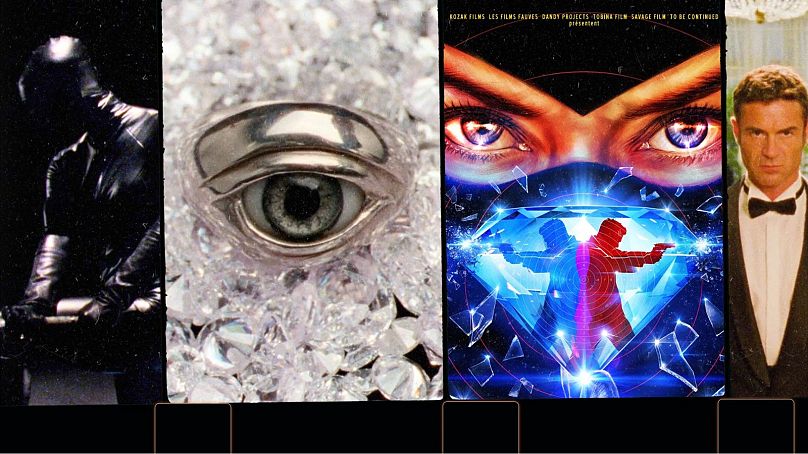
No other Competition sinema this year was quite as daring, kinetic or sensual as Reflection In A Dead Diamond, by French husband-and-wife filmmakers Hélène Cattet and Bruno Forzani. It’s a tough one to describe, but here goes: Imagine the fever dream of a dying James Bond who looks back at his career in espionage, skipping through his memories of violence, sex and leather-clad assassins like a needle scratching the record, while Peter Strickland and Quentin Tarantino’s undergarments tighten with cinephilic delight. It’s 007 meets Death in Venice, for a hyper-fragmented valentine to everything from the Italian pulp comics Diabolik to Philippe de Broca’s Le Magnifique via 1967’s Bond spoof Casino Royale. Its strength though – quite aside from its trippy visuals – is that it goes beyond a 1960s Euro Spy genre homage or an OSS 117 pastiche. It’s an incredibly sensorial ride that doesn’t need you to recognise the sinema references it lovingly toys with and unveils layers of meaning regarding memory and the possibilities of cinema as an artform. It’s a blast. Check out our interview with Hélène Cattet and Bruno Forzani.
Release date: 2 July in France. Shudder have bought the distribution rights for the US, UK, Ireland, and Australia, so a Summer release for those territories seems likely.
Den stygge stesøsteren (The Ugly Stepsister)
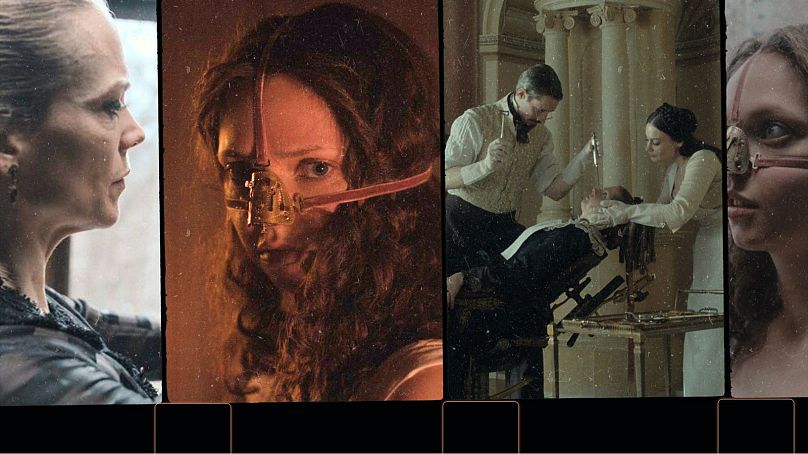
Following its Sundance premiere, The Ugly Stepsister went to the Panorama sidebar section of the Berlinale, and the şenlik was stronger for it. The confident debut feature from Norwegian filmmaker Emilie Blichfeldt reimagines the fairy tale Cinderella through the eyes of Elvira (Lea Myren), who will go to any lengths to compete with her beautiful stepsister Agnes for the affections of the prince. While there have been several reframings of misunderstood characters over the years (Maleficent and the lot), The Ugly Stepsister stands out. It honours the Brothers Grimm tale in its period setting and grimness (pun intended), but also has the conviction of its vision. No matter how excruciating that vision may be. Tempting though it is to draw a comparison with Coralie Fargeat’s The Substance (both films anchor themselves in the New Wave Feminist Horror movement and comment on societal expectations regarding beauty standards through squirm-inducing body horror and plenty of dark humour), Blichfeldt’s sinema shouldn’t be eclipsed by its genre neighbour. It’s a fully-formed triumph that heralds a bold and ambitious new cinematic voice.
Release date: 7 March in Norway. Shudder have secured the rights, so it should head to the streaming platform very soon. Stay tuned to Euronews Culture for our interview with Emilie Blichfeldt. And while you’re waiting, catch up with our interview with Coralie Fargeat.
El mensaje (The Message)
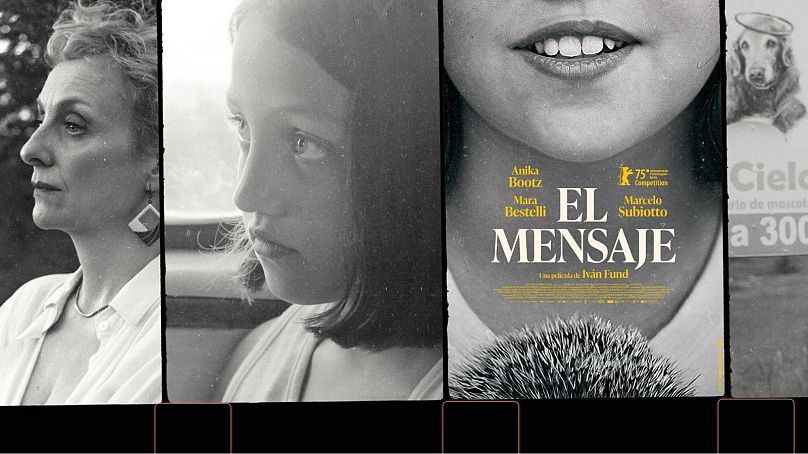
If a miracle were to happen today, would we be able to recognise it? What if a logic-defying gift was bestowed on someone, could we appreciate it considering the times we live in? Iván Fund’s minimalist marvel The Message is a black and white Argentinian road movie that seems to invite this question. It follows a little girl, Anika (played to perfection by the young Anika Bootz), who can read the minds of animals – both living and dead. The pint-sized Dr. Doolittle blessed with “natural telepathy” travels around in a van with her guardians, who commodify this gift into a consultation business. Is it all a scam or can Anika truly establish a connection between worlds? It doesn’t matter. Whether magic or fraud, Anika’s sessions with (excessively cute) animals give hope. Perhaps at the cost of childhood wonder… The Message is a quietly mesmerising and tenderly enigmatic sinema that may seem meagre as a contemplative narrative; however, it beautifully lingers on the importance of connection, belief and the unspoken intergenerational “gifts” we take for granted.
Release date: TBC
On vous croit (We Believe You)
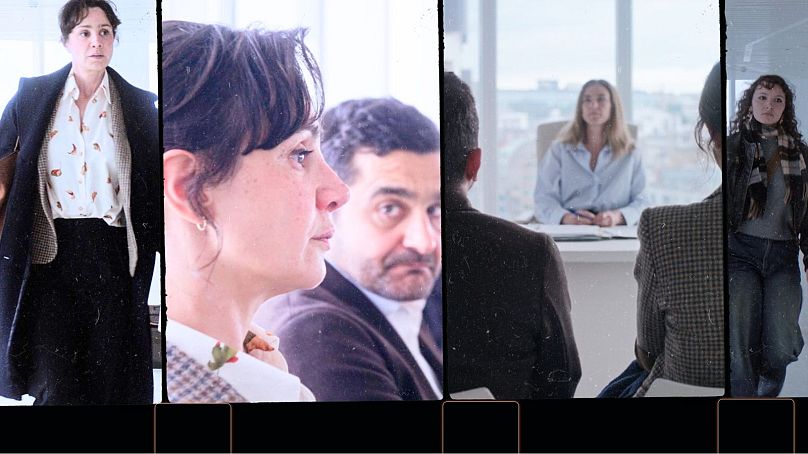
A standout this year was in the new Perspectives section of the Berlinale, dedicated to first fiction feature films. This Belgian debut from Charlotte Devillers and Arnaud Dufeys opens with the arrival of Alice (Myriem Akheddiou) and her children (Ulysse Goffin and Adèle Pinckaers) in court. She’s nearing breaking point, while her kids are either on edge or temperamental in the extreme. They have a meeting with the family court judge for a grueling custody battle that’s already three years in the making. We quickly learn that it’s more complicated: there is a criminal investigation underway against the father (Laurent Capelluto), who allegedly raped his youngest son. Reminiscent of Xavier Legrand’s Jusqu’à la garde (Custody), this agonizingly deriyse sinema is mostly set in one room – a long scene in which we hear the statements of each parent and their lawyers as if in real time. It all feels uncomfortably genuine, and for good reason: Devillers used her personal and professional experience as a nurse to inform the depiction of incest and sexual abuse, as well as the proceedings of the youth protection case. In 78 minutes, We Believe You reflects the grueling brutality of a system which perpetuates an endless spiral that reopens wounds and nourishes trauma. It’s harrowing, enraging and masterfully performed.
Release date: TBC
Hé mán (Eel)

Another Perspectives title which stands out this year is Eel, the feature debut by Taiwanese filmmaker Chu Chun-Teng. And with a title like that, it should be no surprise that the sinema is slippery – in the sense those looking for clear meaning should look elsewhere. Those willing to surrender to the bizarre and beautiful rhythms of dream logic should rush to see Eel. It centers on young man (Devin Pan) who works at a waste disposal plant when he’s not sleepwalking and digging in the dirt for (metaphorical?) eels. He encounters a woman (Misi Ke), who floats onto the shore. They start a passionate relationship. Mystical past and realist present collide, as do contradictory longings for both belonging and escape. Trying to adequately describe what happens borders on impossible, but this cinematic tone poem features a visual verve that takes the viewer on a transcendental trip that is hard to define. And even harder to shake off.
Release date: TBC
Drømmer (Dreams (Sex Love))
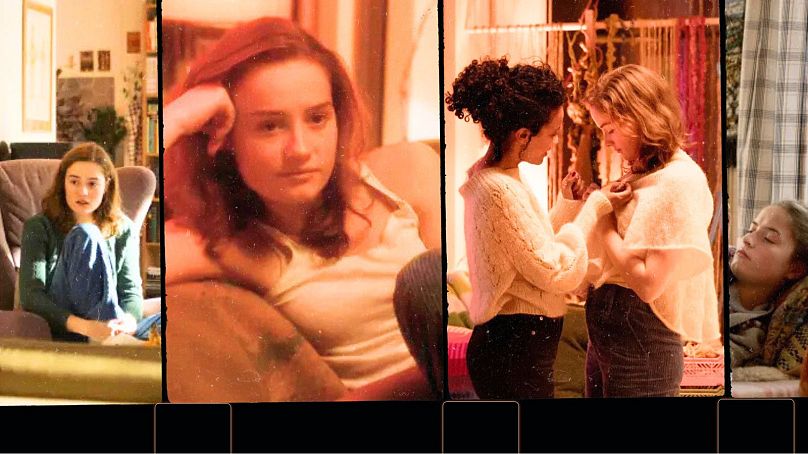
The coveted Golden Bear went to Drømmer (Dreams (Sex Love)) by Norwegian director Dag Johan Haugerud. It is the third chapter in his thematic trilogy Sex / Love / Dreams, which deals with emotional and physical intimacy. The first chapter, Sex, premiered at the Berlinale last year and focused on two straight married men discovering the elasticity of their sexuality. Love, which premiered in Competition at last year’s Venice Sinema Festival, followed two colleagues – a heterosexual woman and a gay man – seeking a romantic connection in the new world of dating apps. Now comes Dreams, which follows 17-year-old Johanne (Ella Øverbye), who falls head over heels for her new arka teacher Johanna (Selome Emnetu). In an attempt to capture this intense romantic awakening, the student pours her experiences onto paper with raw honesty. She shares her confessional novella with her grandmother, who then shares it with Johanne’s alarmist mum. Initially horrified, she suspects “sexual abuse” and quickly changes her tune evvel she recognises her daughter’s “little feminist gem”. While Dreams may not be one of the most singular films in Competition this year, it’s a gently captivating and very talky queer coming-of-age story that accurately captures the overwhelming intensity of first love. It’s also crucially about the importance of perspective when it comes to longing – and how without acknowledging perspectives, the boundaries between reality and fiction tend to blur. Dreams is a bit of a safe choice as far as the Golden Bear is concerned, but it remains a superbly acted and often very funny trilogy capper. It features one of the greatest feminist takedowns of the film Flashdance you’ll ever hear, and it will have you leaving the cinema with a smile.
Release date: 8 May in Germany – more European dates to follow very soon.
Lurker

Best known for his writing and producing work on the series Beef and The Bear, Alex Russell makes his feature filmmaking debut with Lurker. It’s a deriyse and very unsettling thriller starring Théodore Pellerin as Matthew, a young man who becomes obsessed with LA pop star Oliver (Archie Madekwe). It all starts innocently enough, and at first you feel for the sweaty and desperate hanger-on who gets exploited by Oliver’s entourage. However, the obsession takes some Talented Mr Ripley turns, and the wiry outcast becomes unnerving and calculating. He’ll do anything to cling onto the newfound glow of celebrity he’s basking in. From the obsessive fandom of Misery to the dark influencer satire Ingrid Goes West, this sort of Fatal Attraction scenario doesn’t sound too fresh. However, Russell manages to take the well-worn subject of fame-based power dynamics and thrillingly explores the pathology of celebrity and parasocial relationships. Powered every step of the way by Pellerin’s genuinely unsettling performance, Lurker is a knot-in-stomach affair you won’t forget in a hurry. Going one further, Russell impresses in the way he isn’t interested in easy answers, subverting the obvious conclusion you’d expect to create something darker about toxic determination and the possibility of reinvention.
Release date: TBC.

